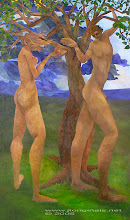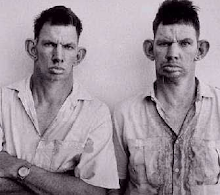Why Should I be Governed?
The point of this unit is to look at the philosophical foundations of political systems: how can we justify the very idea of having a government that can force people to follow laws they may not agree with?
We must remember that government is not a natural phenomena; governments have been created by people. We may feel far removed from the ideas and communities that shape our politics, but we’re not; political institutions are continually evolving and we all help to shape them. If politics doesn’t seem very real just watch the riots going on in Greece currently.
Legitimacy & Authority: what gives government the right to govern?
We need to understand the way political theories have tried to justify and ‘ground’ the right of governments to govern.
We need to ask:
• how have ideas about human nature shaped our political institutions?
• what makes power legitimate? (what gives someone or some people a the right to claim power over others?)
• what is the difference between being ‘in authority’ and ‘an authority’? (basically the difference between having power and having ‘wisdom’ or expertise) (See Jake for alternative interpretation)
• how might we justify acts of disobedience and dissent against a government if we don’t like what they do?
Thomas Hobbes’ Leviathon
We began examining these ideas and questions through through Thomas Hobbes’ famous book, Leviathon. We saw how Hobbes, writing during the English civil war, a period when ideas about legitimate power were up for grabs, tried to justify the idea of having a powerful leader, a ‘leviathan’, to keep people in order. (He wrote it in France just in case it upset anyone - which was easy to do and potentially fatal at that time!)
Man in the ‘State of Nature’ A Pre-societal Situation
Hobbes grounds his ideas about government with an account of the way he feels people would behave without government or society of any kind. He thinks that people in this ‘natural condition’ before any kind of society (pre-societal) would be more or less ‘equal in the faculties of body and mind’, but rather than suggesting that this would make people co-operate he thinks it would mean that ‘the weakest has strength enough to kill the strongest’, even if they have to get together with other ‘weaklings’ and sneak up on the strongest person to kill them. What’s more he thinks that people in this situation would be quite happy to do someone else in if it was to their own advantage.
Hobbes believes that,
From this equality of ability ariseth equality of hope in the attaining of our ends. And therefore if any two men desire the same thing, which nevertheless they can-not both enjoy, they become enemies;
In other words because we are roughly equal, we see everyone else as competition and so we are bound to ‘quarrel’
Hobbes distinguishes;
‘three principal causes of quarrel. First, com-
petition; secondly, diffidence; thirdly, glory.
He tells us that,
‘The first maketh men invade for gain; the second, for safety; and the third, for reputation.’
In other words:
- We fight each other to get stuff.
- We fight each other because we don’t trust or care about each other.
- We fight each other because we do care if people don’t respect us.
Hobbes characterised all this nastiness amongst people in the ‘natural condition as a ‘war of every man against every man’ So Hobbes’ view of human nature is rather bleak and pessimistic.
Social compact
We saw how Hobbes believed that despite all this unpleasantness men’s reason would allow them to recognise the first and ‘fundamental law of nature .. which is: to seek peace and follow it.’ They would recognise this because it would represent their best chance of survival as in the ‘state of war’ there is ‘no place for industry, because the fruit thereof is uncertain,’ in other words there’s no point building a shelter as someone will kick you out of it pronto! He also says there would be;
no culture of the earth; no navigation, nor use of the commodities that may be imported by sea; no commodious building; no instruments of moving and removing such things as require much force; no knowledge of the face of the earth; no account of time; no arts; no letters; no society;
Nothing in fact but lots of bundles. (Aggro! as we used to say in the 70’s) (Violence!)
So the rational thing to do is ‘to seek peace’, and from this first law of nature a second law follows: ‘that a man be willing, when others are so too, [to] be contented with so much liberty against other men as he would allow other men against himself.’ In other words you give up your right to interfere with others if they give up their right to interfere with you. In making this kind of agreement you entering into a contract; Hobbes says ‘The mutual transferring of right is that which men call contract.’
Hobbes believed that given the selfish and competitive nature of humankind the only way such a contract could be guaranteed was for it to be overseen by a powerful leader who could punish any who broke it. He thought that ‘nothing is more easily broken than a man's word’ but that we might keep this contract ‘from fear of some evil consequence upon the rupture.
This leader is Hobbes ‘Leviathan’; the Leviathan is both an embodiment of the people (see the picture from the front of the book, the ‘frontispiece’) and a great power above the people. It represents the combined power of all the people and through this power it overpowers those individuals who break the compact not to harm others.
Although Hobbes was against the hereditary principle by which Kings were born not chosen, he believed that the most effective form of leadership was some kind of monarch or dictator.
Hobbes is most famous for suggesting that without such a ruler the life would be ‘solitary, poor, nasty, brutish, and short.’
John Locke
We read the first four chapters of Locke’s ‘Second Treatise on Government’ and saw that his view of the way people would behave in ‘the state of nature’ was a little different to Hobbes’. Locke’s ideas are informed by his view of human beings as having a capacity for reason and his belief in God, which is perhaps a little surprising after studying his empiricist epistemology.
Locke believed that ;
The state of Nature has a law of Nature to govern it, which obliges every one, and reason, which is that law, teaches all mankind who will but consult it, that being all equal and independent, no one ought to harm another in his life, health, liberty or possessions;
So Locke thinks that being rational creatures we should come to recognise the ‘law of nature’ that we all share basic equality and rights. He believes that these ‘natural laws’ are universal and apply to all people regardless of place or circumstance. His view is bound up with the belief that;
‘men being all the workmanship of one omnipotent and infinitely wise Maker; ... sent into the world by His order and about His business; they are His property, whose workmanship they are made to last during His, not one another’s pleasure.’
It’s as if because God made us he owns all the rights to us and therefore we have no right to interfere with each other. This principle of owning things because you have worked to produce them is important to Locke, and we’ll come back to it below. (In the his ideas about property - have you washed your Dad’s car yet Sam?)
For Locke the big problem of living in the state of nature is the lack of someone unbiased and independent to help you preserve and exercise your these natural rights. The answer to this problem is to trade your right to judge and punish those that break the natural laws through a contract with others that establishes a government to act as a defender of your rights and judge any disputes that may occur.
Locke says, ‘in the state of Nature every one has the executive power of the law of Nature’ but that it is ‘unreasonable for men to be judges in their own cases [because] self-love will make men partial to themselves and their friends.’ Therefore ‘civil government is the proper remedy for the in- conveniences of the state of Nature, which must certainly be great where men may be judges in their own case’.
It is in the act of contracting with others that - agreeing the social contract - that we show our consent to be governed. And it is through our consent that the government can claim legitimate authority.
As ever things aren’t really that simple because the initial agreeing of the contract is a largely hypothetical idea, certainly it is pretty irrelevant to us that a ‘contract’ was made way back when. Of course there have been thousands of real contracts, real laws agreed between people and government over the hundreds of years since what we recognise as government came into being, and many of those laws still shape our lives. But what Locke and other ‘social contract’ theorists are interested in is the original justification of the very idea of having a system of government and law enforcement at all, and what must be the case for that government to claim to be legitimate.
Of course Locke realised that the legitimacy of a government’s authority could not rest on this original act of consent, but he believed that by living in a society and accepting the advantages that it gave us we were in effect giving our consent. This kind of consent he called ‘tacit consent’ and it is very important concept in political philosophy. The extent to which we might agree that we have given our consent to a government depends on the extent to which we feel we have any choice about participating in the facilities it provides. After all we don’t really individually opt to take advantage of the schools or healthcare the government provides, our parents make that decision for us; and the possibility of opting out, of abandoning the society of our birth is not very easy.
Hume mocked the idea of tacit consent, he compares it to the situation of someone ‘press-ganged’ into the crew of a ship, he says,
Can we seriously say, that a poor peasant or artizan has a free choice to leave his country, when he knows no foreign language or manners, and lives from day to day, by the small wages which he acquires? We may as well assert, that a man, by remaining in a vessel, freely consents to the dominion of the master; though he was carried on board while asleep, and must leap into the ocean, and perish, the moment he leaves her.
Hume’s basic point is still relevant even in contemporary societies where ‘peasants’ often have more economic power and opportunity for travel than he envisaged.
Anyway, getting back to the point, Locke’s view differs from Hobbes’ in that he sees humankind as capable of recognising the ‘natural’ rights of others. He sees the point of making a social contract as being a way of mutually defending and preserving these rights. Hobbes sees the contract as a means of basic protection from other people - a way of ensuring that we are free to build our lives and our communities free from the state of war that would exist without it.
A Note about Locke and Property
As we saw above, Locke makes a lot of the idea that we are God’s ‘workmanship’, suggesting that the ‘work’ of creating us establishes his right of ownership of us. Locke seems to extend this principle of owning things because you have worked to produce to people, claiming that;
As much land as a man tills, plants, improves, cultivates, and can use the product of, so much is his property. He by his labour does, as it were, inclose it from the common.
Locke places three conditions on property rights, he suggests that;
1) one may only appropriate as much as one can use before it spoils (Two Treatises 2.31)
2) one must leave “enough and as good” for others (the sufficiency restriction) (2.27)
3) one may (supposedly) only appropriate property through one's own labor (2.27).
These ideas are highly contentious (people are still arguing about what he really meant), they’re not too important for us yet, but I just thought I’d mention them.
Jean Jaqcues Rousseau
We read Chapter 6 of Rousseau's The Social Contract and saw how he thought that in the state of nature people would be naturally compassionate towards one another; that they would have a natural aversion to seeing others suffer.
However, despite this positive disposition towards their fellow beings, Rousseau thought that human beings were rather limited on their own - their intelligence and real potential only begins to be fulfilled once they enter in society with others. Through facing difficulties alone people would begin to form associations with each other.
In other words although people wished no harm on others they were quite happy getting along as fairly solitary 'noble savages' until they faced problems like paucity of resources (not enough or not good enough food, shelter, defence etc.), then they to get together. He puts it like this:
I SUPPOSE men to have reached the point at which the obstacles in the way of their preservation in the state of nature show their power of resistance to be greater than the resources at the disposal of each individual for his maintenance in that state. That primitive condition can then subsist no longer; and the human race would perish unless it changed its manner of existence.
Now, Rousseau believed that no-one has natural authority over any one else, and that Legitimate authority comes only from agreed conventions. So he needed to come up with a form of social contract that seemed to embody the idea of no-on having more authority than anyone else while still establishing an authority that could tell people what to do! He writes;
"The problem is to find a form of association which will defend and protect with the whole common force the person and goods of each associate, and in which each, while uniting himself with all, may still obey himself alone, and remain as free as before." This is the fundamental problem of which the Social Contract provides the solution.
(This gets a bit abstract!!)
Hopefully you can see his solution: he thinks that if everyone gives up all their individual rights to everyone else then 'each man, in giving himself to all, gives himself to nobody; and as there is no associate over whom he does not acquire the same right as he yields others over himself,'. (This sounds rather like Rawls - see below)
Rousseau thinks that this will mean that the conditions and laws of the society constructed on this principle will be fair and reasonable because no-one has any interest in making them harsh. (Because you'd only be making things harsh for yourself.) (This is a little reminiscent of Rawls).
This coming together and mutual pooling of rights creates what he calls the general will, which is like the sum total of everybody's interests:
Each of us puts his person and all his power in common under the supreme direction of the general will, and, in our corporate capacity, we see each member as an indivisible part of the whole.
Thus forged together through this social contract the people form a state or republic and collectively as the 'body politic' they are their own sovereign power.
This sounds all very well, but it does have some drawbacks. For example in Chapter 7 'The Sovereign' Rousseau points out that 'The Sovereign, being formed wholly of the individuals who compose it, neither has nor can have any interest contrary to theirs;' this means that whatever the Sovereign thinks is good for you is good for you because really it's you that thinks it's good for you! (Mmm!)
This leads to Rousseau's rather worrying conclusion that,
whoever re-fuses to obey the general will shall be compelled to do so by the whole body. This means nothing less than that he will be forced to be free'.
Another justification for this is that Rousseau believes that human beings, although basically good, are weak: we have desires and instincts that can lead us to do things that are not good for us. By getting together and becoming part of the 'general will' we are made to do the things that are good for us, so we are able to properly develop our potential as human beings in a way that we could not in the state of nature, or in a society where we were forced to accept the will of a tyrant.
Deontological arguments about the way we should act and how our societies should be governed are based on notions of rightness or wrongness. Something can be considered right or wrong through a religious belief or rational ‘insight’. So you could say that it's wrong to steal because God says so, or it's wrong to steal because as a rational being we should recognise that we all have the right to property that we earn through our labour.
A teleological argument is more to do with the way things function (will society work if we do this?) would say that it's wrong to steal because if everyone stole everybody else's stuff then it would it would be impossible for human beings to function efficiently and fulfil their potential and therefore society could not progress.



























